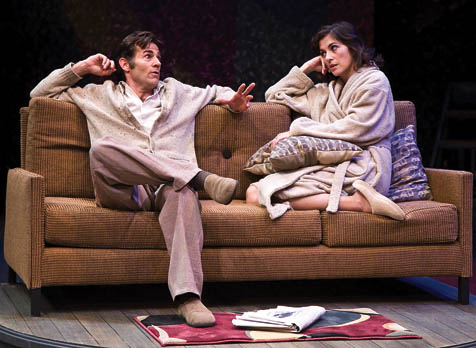The Real Thing
At the Solvang Festival Theater, presented by PCPA.

The clever opening of Tom Stoppard’s acclaimed comedy The Right Thing immediately blurs the boundaries between semblance and reality. An architect who has discovered his wife’s infidelity turns out to be an actor in a play within the play called “The House of Cards.” The audience learns this gradually in the second scene as the actress from that play, Charlotte, discusses her role in it with her real-life husband, Henry-the playwright. In real life, it’s Henry who is having an affair with Annie, a beautiful actress who is also married to someone else-Max. Thus for Max, art imitates life in a painful way as he becomes the cuckolded husband from the play.
Andrew Philpot as Henry and Beverly Sotelo as Annie are passionate performers whose “real thing” deepens in the course of the play. The second act, less unified than the first, expands the focus on Henry’s new marriage with Annie to include Henry’s dynamic growth as a man and a writer. Like his creator, Tom Stoppard, Henry has a superb verbal gift, stringing words together effortlessly into witty repartees, intellectual allusions, and sarcastic puns. Over the course of the play, Henry undergoes a humbling experience which makes him more likeable. An unabashed elitist in his writing standards, Henry is accused of being a snob. Annie asks him to edit her radical friend Brody’s political writing, but Henry finds the Scottish prisoner’s manuscript repulsive, saying, “It’s half as long as Das Capital and only twice as funny!”
Musical interludes echo the sentiments on stage, as when we hear Mick Jagger sing, “You can’t always get want you want.” In the end, art imitates life-again-when Annie has an affair with a young actor in a scene reminiscent of the opening play-within-the-play. Now it is the playwright’s turn to feel jealousy, and Henry becomes jealous enough to allow himself to be vulnerable. The comical denouement involves encounters not only with Charlotte, but also with Henry and Charlotte’s emancipated 17-year-old daughter Debbie. These scenes, and another one with a rude, ungrateful Brody, are deliciously ironic. The set design deserves special notice. The alteration between the plays and the real life scenes succeeded in engaging the audience in the show’s quest for a truth beyond appearances.



